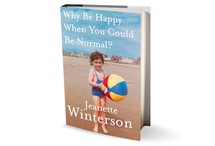
Photo: Philip Friedman/Studio D
8 of 25
Why Be Happy When You Could Be Normal?
By Jeanette Winterson
224 pages;
Grove Press
To read Jeanette Winterson is to love her. Best known as the author of such provocative novels as Oranges Are Not the Only Fruit and Sexing the Cherry, the fierce, curious, brilliant British writer is winningly candid in her memoir, Why Be Happy When You Could Be Normal?(Grove). Adopted by Pentecostal parents in 1960, Winterson was raised in the working-class north of England—"one pair of shoes and no food on Thursday nights before payday." Her adoptive mother, known here only as Mrs. Winterson, saw the universe as a "cosmic dustbin," often locked her in the "coal-hole" or out on the front stoop, and had Winterson exorcised when she discovered her in bed with a female schoolmate. But the author also recounts the good times at rousing tent revivals, in the library where she set out to read "English Literature in Prose A-Z," and with the teacher who took her in when she left home at 16. Winterson went on to study at Oxford, fight for women's rights, vote in 1979 for Prime Minister Margaret Thatcher ("a grocer's daughter"), survive depression, fall in love, become a successful writer, and find her biological mother, all with such a joy for life and love of language that she quickly becomes her very own one-woman band—one that, luckily for us, keeps playing on.
— Louisa Ermelino


